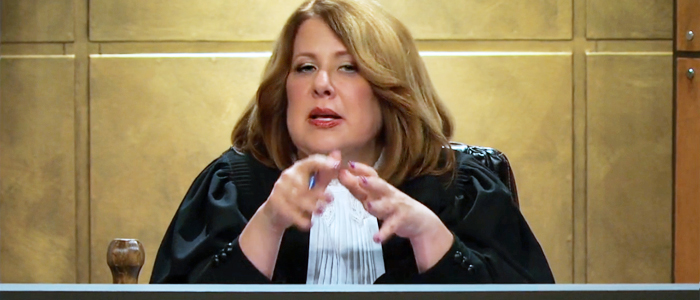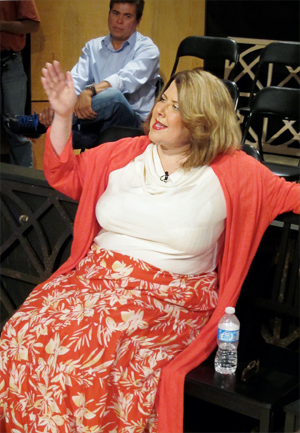 Anne-France Goldwater, BCL’80, brings her no-holds-barred attitude with her as she rules on small claims arbitration cases on her new television show, L’Arbitre.
Anne-France Goldwater, BCL’80, brings her no-holds-barred attitude with her as she rules on small claims arbitration cases on her new television show, L’Arbitre.
Focus online caught up with the fiery lawyer for a conversation about arbitration, law and life.
By Victoria Leenders-Cheng
Mere minutes into the first episode of L’Arbitre, the audience is treated to a full display of Anne-France Goldwater’s no-nonsense demeanour.
The show, styled after American courtroom reality series such as The People’s Court and Judge Judy, features Goldwater ruling on arbitration cases with claims of $7,000 or less and the first episode pits a 23 year-old student against a mechanic accused of selling a defective car.
Halfway through the episode, the mechanic, belligerent from the get-go, interrupts Goldwater one time too many and she snaps.
“You will wait until I ask you a question to answer,” she says in French, her voice sharp. “We are not equals here: this is my courtroom and you will show the respect that my position demands.”
Chastened, the mechanic nods and Goldwater, her Judge Judy impression finished for the moment, proceeds with her question.
Goldwater, who established the firm Goldwater Dubé in 1981, has become known as groundbreaking litigator in family law and she says she sees this foray into television as an opportunity to educate the public about the role law plays in everyday life.
“I want people to understand what evidence is, what hearsay is, and to realize that a situation is not unfair just because it pisses you off,” she said in a recent conversation, adding that she expects a degree of individual accountability as well: “I don’t mind chastising people for failing to read contracts – read it before you sign it!”
But, she said, “I also understand that people are motivated by other stuff when they make decisions, that interpersonal relations can affect our choices, that someone just might lend $500 to a niece who is not credit-worthy.”
The parties who appear before Goldwater sign an arbitration agreement beforehand indicating that they will abide by the decision and Goldwater said that, above all, she wants the cases she hears to be resolved peacefully.

“I want people to feel at ease enough that they can tell their story and hear the other side,” she said. “Small claims court cases aggravate people to no end but what they generally need is a resolution they perceive to be reasonable and fair.”
In the case of the student and the mechanic, Goldwater’s questions probe both the personal and the factual: we discover that the student, a young woman who had recently broken up with her boyfriend and wanted to return to her family in Abitibi, did not think to have the car inspected before paying for it. We also discover that the Ed Hardy-clad mechanic made vague promises to assist with repairs that the car obviously needed.
“We’re not learning about statutes here,” Goldwater said. But, she added, whether in small claims cases or in the cases she has argued on same-sex marriage and the rights of common law couples, she circles back to the same basic tenet: “In life, the reality is that no matter how you argue a case, there is no one right answer. The answer is that ‘it depends.’”
In that regard, Goldwater noted, the “creative legal training” she received at McGill has proven invaluable.
“If I come to court, I am equally ready to distinguish the case law against me as I am the case law for me, and that’s because I learned at McGill that every question can have six different answers. My training taught me to prepare all six answers and that intellectual foundation has permitted me to plead the consequential cases I’ve won.”
L’Arbitre can be seen on the “V” channel each week. vtele.ca/emissions/l-arbitre/
